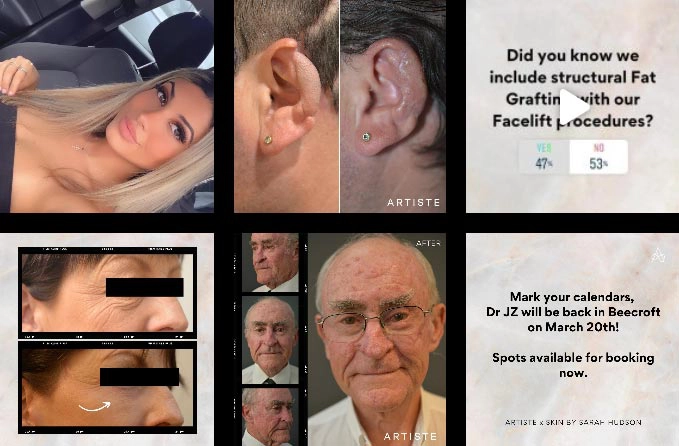How Long Does A Facelift Last?
Model featured in photography
If you’re considering ways to address signs of ageing such as wrinkles or changes in skin elasticity, it’s natural to wonder how long the effects of certain treatments might last. The duration of results can vary based on several factors, including individual characteristics such as lifestyle, skin type, and the specific approach tailored to your needs.
In this article, we’ll discuss general information about the factors that may influence the appearance of facelift results over time. For personalised advice, we encourage you to consult with a qualified professional to explore options suited to your goals.
Key Factors That May Influence The Longevity of Facelift Results
- Skin Type and Quality: The elasticity and health of your skin can impact the appearance over time. Factors such as hydration, sun exposure, and lifestyle habits may also contribute.
- Age at the Time of Surgery: Younger patients typically have better skin elasticity, which may influence their results. However, people of all ages can achieve noticeable improvements depending on their unique needs and goals.
- Surgical Technique: The method used by the surgeon can influence outcomes. Approaches that address deeper layers of tissue may provide different benefits compared to those focusing on the surface layers of the skin.
- Genetics: Your genetic makeup can affect the way you age, which may influence how long certain changes remain visible. Everyone’s skin responds differently based on their unique biology.
- Professional Expertise:Working with a qualified and experienced practitioner can help ensure the treatment is suited to your facial anatomy and individual needs.
The Impact of Lifestyle Habits
Lifestyle choices have a considerable impact on how long facelift results last:
- Sun Exposure: Excessive sun exposure can accelerate skin ageing. Protect your skin by wearing sunscreen daily and avoiding prolonged exposure to the sun.
- Smoking: Smoking decreases blood flow to the skin and can lead to premature ageing.
- Diet and Hydration: A balanced diet rich in antioxidants and staying hydrated can help maintain skin health and elasticity.
- Stress Management: High stress levels can negatively affect skin health. You may consider incorporating stress-reducing activities like yoga or meditation into your routine.
- Regular Skincare: Using quality skincare products as part of your daily routine can support skin health. Products designed to promote collagen production and maintain hydration may be particularly beneficial for preserving skin elasticity and smoothness.
In conclusion, while a facelift can offer significant improvements, the longevity of the results depends on various factors, including individual characteristics and lifestyle choices. It is important to consult with your GP and a qualified surgeon to understand how the procedure works, including its potential risks and complications.
If you want to learn more about facelift in Sydney, reach out to Artiste Plastic Surgery. Our Specialist Plastic Surgeon, Dr Jack Zoumaras, has extensive experience with facelift and has deep knowledge on facial anatomy. Schedule an appointment today.
Disclaimer: At Artiste Plastic Surgery, our Plastic Surgeons led by Dr Jack Zoumaras have been trained to the highest possible degree. All surgery has risks and it is always advised to get a second opinion. Risks are very real and we cannot guarantee any result. Results are illustrated as a guide only. All risks are managed and any need for revision surgery or complications (1-5%) can be managed by our specialist plastic surgeons.
Any statements on how you will feel is based on Level V Evidence:
Level V: How you will feel after plastic surgery varies between individuals, depending on psychological and physical factors. Our internal research is based on how patients in our practice feel after surgery.
The blogs are not a substitute for a medical consultation and do not form as part of the doctor to patient relationship.
SHARE THIS ARTICLE
Jul01
Facelift Recovery Tips: What Speeds Up Healing and What to Avoid
Disclaimer: At Artiste Plastic Surgery, our Plastic Surgeons led by Dr Jack Zoumaras have been trained to the highest possible degree. All surgery has risks and it is always advised ...
Jul01
How to Prepare for Facelift Surgery: What to Do Before Your Big Day
Disclaimer: At Artiste Plastic Surgery, our Plastic Surgeons led by Dr Jack Zoumaras have been trained to the highest possible degree. All surgery has risks and it is always advised ...
ABOUT ARTISTE
Artiste Plastic Surgery is an Award Winning Specialist Plastic Surgery practice led by internationally trained Dr. Jack Zoumaras, Plastic Surgeon and Peer Reviewed Face Surgeon
Artiste offers the latest Cosmetic Surgical Procedures of the Face, Breast and Body, inspired from leading centres around the world.
STAY IN THE LOOP
Enter your email address below to receive updates on new articles and VIP access to promotions and special offers.
FOLLOW US ON INSTAGRAM










